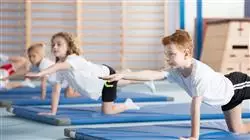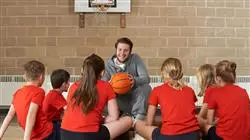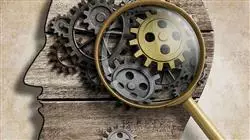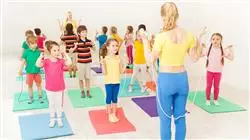University certificate
Scientific endorser

The world's largest faculty of sports science”
Description
Motor action as a tool in the development of emotions in neuroeducational processes. A novel concept of enormous importance for the quality of life of students"

Emotional development in conjunction with cognitive development is gaining ground in the way education is approached. This concept has also been significantly development with the support of neurosciences applied to education. In this new approach, Physical Education acquires a dimension of extraordinary importance, transcending beyond the crucial objectives of developing motor skills into the use of movement as a tool for the development and improvement of cognitive functions. The study of emotions in the educational processes based on motor action becomes essential for the work in this fascinating field of education.
The prestigious professors of this program have drawn on their specialized and advanced knowledge based on experience and rigorous scientific criteria in the development of this highly scientifically and academically rigorous training.
All modules are accompanied by abundant iconography, with photos and videos by the authors, which are intended to illustrate, in a very practical, rigorous and useful way, advanced knowledge in neuroeducation and physical education for physical therapists.
Content chosen to make this course a highly effective learning process"
This postgraduate diploma in Emotions in Neuroeducational Processes Based on Motor Action in Sport contains the most complete and updated scientific program on the market. The most important features of the program include:
- Case studies presented by experts in Neuroeducation and Physical Education
- The graphic, schematic, and eminently practical contents with which they are created provide scientific and practical information on the disciplines that are essential for professional practice
- It contains practical exercises where the self-evaluation process can be carried out to improve learning
- With special emphasis on innovative methodologies in Neuroeducation and Physical Education
- All this will be complemented by theoretical lessons, questions to the expert, debate forums on controversial topics, and individual reflection assignments
- Content that is accessible from any fixed or portable device with an Internet connection
- Complementary content available in multimedia format
A highly specific online postgraduate diploma, which will allow you to acquire the necessary tools to work on emotions based on motor action in a short period of time"
The program ncludes in its teaching staff professionals belonging to the field of Neuroeducation and Physical Education, who pour into this training the experience of their work, in addition to recognized specialists belonging to reference societies and prestigious universities.
Thanks to its multimedia content developed with the latest educational technology, it will allow the professional a situated and contextual learning, that is to say, a simulated environment that will provide an immersive learning programmed to train in real situations.
The design of this program is based on Problem-Based Learning, by means of which the educator must try to solve the different professional practice situations that arise throughout the course. For this, the educator will be assisted by an innovative interactive video system, developed by recognized experts in the field of Neuroeducation and Physical Education with extensive teaching experience.
Incorporate a neuroscientific approach to your work in the area of Physical Education to add to your teaching objectives cognitive and emotional development through this new form of educational intervention"

The advances in neuroeducation in the area of Physical Education, from an eminently practical approach that will allow you to give an innovative twist to your professional practice"
Objectives
The main objective of this comprehensive postgraduate diploma is to provide the student with the vision and skills necessary to turn the area of Physical Education into an invaluable tool for the development of integral human well-being. Beyond its potential in physical terms, this Postgraduate Diploma will work on the protective capacity of the brain, its influence on brain function, emotions, motivation, and perception, in short, learning.

Motor action as a starting point for working on the emotional processes associated with cognitive development"
General Objective
- Know the basis and main elements in Neuroeducation
- Integrate the new contributions in Brain Science in teaching-learning processes
- Discover how to enhance brain development through motor action
- Implement the innovations in Neuroeducation in the subject of Physical Education
- Achieve specialized training as Neuroeducation professionals in the field of motor action
Specific Objectives
- Demonstrate how Physical Education can "attract" learners and be an includion factor in social equity, a fundamental reason to encourage school/kindergarten attendance
- Generate opportunities for teacher exchanges and training, coordinating directors and inspectors to promote higher work quality and efficiency in this institutionalization of
- School Physical Education
- Permanently update the National and Jurisdictional Database, with data provided directly from the territory by the stakeholders themselves. (Director, Coordinators and Inspectors)
- Produce general guidelines for the Physical Education Area that orient, advise and facilitate the work of Teachers, Coordinating Directors and Inspectors
- Coordination and support to the National Thematic Commissions in this area of knowledge
- Continue the task of achieving the Universalization of Aquatic Activities
- Support the participation of our public schools in different sporting events in order to solve motor situations with a diversity of stimuli and spatial-temporal conditioning
- factors, selecting and combining basic motor skills and adapting them to the established conditions in an effective manner
- Use the expressive resources of the body and movement in an aesthetic and creative way, communicating sensations, emotions and ideas

Get up to date on the new pedagogical and evaluative processes in physical neuroeducation and give a fresh boost to your professional career"
Postgraduate Diploma in Emotions in Neuroeducational Processes from the Motor Action in Sport
The application of the theoretical and practical approaches of neurosciences in the field of physical education are of great importance to ensure the comprehensive development of children. Therefore, at TECH Global University we have created a program focused on the teaching of this subject as a way to improve athletic and academic performance and, simultaneously, to ensure the emotional well-being of students. Specifically, our curriculum covers the theoretical and practical foundations of the neuroeducational discipline, the chemical structure that determines the brain reward system, the pedagogical models of instruction and evaluation (Models of Sports Education MED and Personal and Social Responsibility, Comprehensive Model of Sports Initiation TGfU, Ludotechnical and Adventure Education, among others) and the methodologies that allow the construction of such didactic spaces. At the end of the proposed course, it is expected that professionals make the most of the expressive resources of the body, incorporating them in plans that have a wide diversity of movement stimuli and spatial-temporal constraints.
Postgraduate Diploma in Neuroeducational Processes, Emotions and Motor Action
With this TECH Postgraduate Diploma it is possible to enrich daily teaching practice, since the necessary tools are provided for the promotion of sport-expressive activity, through the planning and execution of didactic strategies that potentiate motor, cognitive and socioemotional skills. Thanks to the mastery of knowledge regarding the impact of psychological processes in the brain articulations that make understanding and communication possible, teachers will be able to detect the main problems that hinder such understanding in order to solve them through the use of different mechanisms to activate attention, memory, emotion, motivation and creativity. Likewise, future graduates will design physical adaptation programs, where activities that strengthen individuality and cooperation will be prioritized and the contributions of this brain science that address the relationship between emotions and motor action will be integrated. All this will guarantee not only their insertion in the labor market, but also their excellent performance in promoting integral development based on exercise, good habits and mental health.







